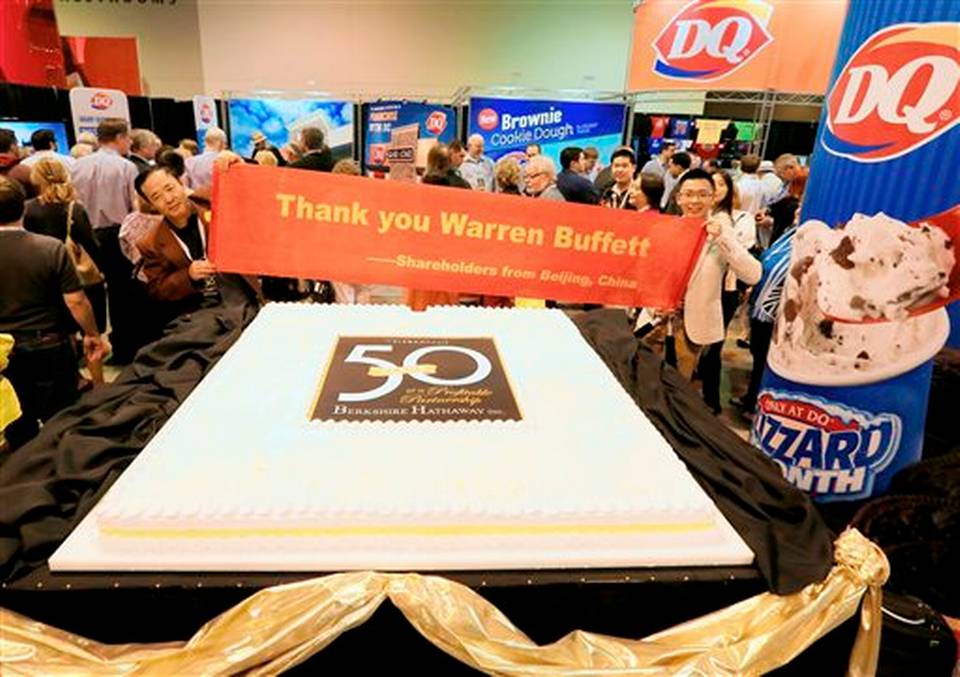by William Smead, Smead Capital Management
The 50th annual meeting of Berkshire Hathaway with Warren Buffet as Chairman was filled with sugar and spice and everything nice. We at Smead Capital Management always look for three key takeaways from the annual meeting of Berkshire Hathaway. This year we think we can sum it up by using the 19th Century nursery rhyme.
We want to learn whatever we can from the investment wisdom (sugar) of the most successful stock pickers and asset allocators of all time. Second, we seek to understand their limitations and human fallibility (spice), with an eye on improving our own. Finally, we try to glean whatever vision (everything nice) these two experienced business owners will share of the next five to ten years for comparison sake.
SUGAR
Sugar was everywhere at this year’s annual meeting. Berkshire owns Coke (KO), Dairy Queen, Heinz and See’s Candy. One shareholder wanted to know why Berkshire is so heavily committed to companies which make most of their money peddling sugar-heavy ingredients in a world which recognizes its damaging health effects.
This was a perfect opportunity for Buffett and Munger to teach shareholders about addictive products, temporary fads, stellar brands and human nature. Today’s millenials probably think that they are the first health-conscious age group to ever come through the pipeline. Have they heard of the prohibition of Alcohol in the 1920’s and 1930’s? What about taking cigarette advertisements off of television in the 1960’s, or the Atkin’s and North Beach diets which were popular with Gen Xer’s in 2003?
Here is how Buffett and Munger responded to the following question from a shareholder:
Shareholder Question: “Over the last fifty years we have been long sugar consumption. Have we reached an inflection point for Coke and Heinz?”
Buffett: “They have a wide moat, but things are always changing. All food and beverage companies will adjust to the expressed preferences of their consumers. Twenty years from now there will be more Coke consumed than there is now. I am one quarter Coca Cola by calories consumed. All that sugar has helped me live longer because it has kept me happy. If I’d have eaten broccoli and Brussels sprouts, I would have eaten in a prison. I don’t see smiles on the faces of the people at Whole Foods!”
Munger: “Sugar is a wonderful substance, it prevents softening of the arteries and it keeps me from living a few years drooling in a nursing home.”
Smead Capital’s Interpretation: Just because some people change their habits doesn’t mean there won’t be new humans who come along who want their taste buds to make the choice for them. Long-duration, wide-moat companies all have some adapting to do over the years, but eating habits are pretty predictable by the time folks are fifty years of age.
SPICE
A shareholder questioned the business practices of a Berkshire-owned business creating the spice at the meeting. The shareholder wanted to know what Buffett and Munger thought of the scathing investigative report from The Seattle Times on the lending practices of Clayton Homes, a wholly-owned subsidiary of Berkshire Hathaway. Buffett’s answer was straight out of our first criteria for stock selection; Clayton meets an economic need.
Buffett: “Clayton follows a pattern that is exemplary in lending. We have no interest in selling a house to someone who defaults. Manufactured homes are purchased by people who have low FICO scores. Three per cent fail each year. We help them with our own money at risk. If the loan fails, we lose money. The article didn’t include expenses. We have a lender board which shows a variety of lenders for buyers to consider.”
Smead Capital’s Interpretation: There are imperfections in all businesses. Buffett reminded everyone that Clayton sells 50% of all the manufactured housing in the U.S. To buy a brand new Clayton home and put it on the average lot in America creates about a $600 per month mortgage payment. It is impossible to loan money to people with average to below-average credit scores and to not have a large number of them fail. Clayton is very profitable, including the default rates, because they meet a basic need very economically: They provide homes to the lowest incomes in society.
EVERYTHING NICE
When Buffett and Munger were asked to peer into the future based on what we know today about stock market levels, corporate profit margins, housing and activist investors, their replies were “everything nice” when compared with our own vision of the future.
Shareholder Question: “With stock market levels approaching 125% of GDP and profit margins at all-time highs are you concerned like you were in 1999?”
Buffett: “The profit margin shows that business has prospered incredibly. The interest rate environment has caused profits to be worth a whole lot more at 1% than at 5%. I look at those numbers in the context of a world of incredibly low interest rates. If rates stay low, stocks will rise in the future. At normalized interest rates, these prices will come down.”
Munger: “We don’t know what will happen in one, two or three years and never have. We have made very little progress by out-guessing macroeconomic factors. We haven’t seen a lot of success among the people who try to predict macro factors.”
Buffett: “We think if a company has an economist, it has one too many employees.”
Shareholder Question: “On single-family housing, you have thought it would pick up. Is something more secular going on or is it more cyclical?”
Buffett: “Household formation has turned up in the last six months. I would expect it to turn up. It always is affected by recessions.”
Munger: “I have grandchildren that I wish would find a suitable spouse, promptly!”
Shareholder Question: “If Buffett is giving away his shares, how will Berkshire defend against activists?”
Buffett: “There is a lot of benefit to staying in the same corporate tax return. Unlikely, the sum of the parts will be worth much more than the whole. So much money is chasing them (activists); it looks like they are really reaching! My super-voting power will rule for a long time.”
Munger: “When stocks were cheaper, companies weren’t buying back stock. Now the shares are much higher and they are being urged to.”
Buffett: “History is buy backs are slow when they are cheap and pick up when they are expensive.”
Munger: “This is not a great age, this age of activism. I don’t know any activist I want marrying into my family.”
Smead Capital’s Interpretation: We like owning companies which can benefit from economic strength brought on by today’s demographics. A sizable housing rebound from the post financial-meltdown era would drive interest rates higher and pinch the profit margins of what Buffett called, “capital intensive businesses.” With companies which meet our eight criteria for stock selection, we like our chances in today’s circumstances. When it comes to activists, we like owning companies for long durations and we, like Munger, assume that short-term success rarely leads to maximizing long-term wealth creation. More simply stated, it’s less likely to give us “Everything Nice.”
Warm Regards,

William Smead
The information contained in this missive represents SCM’s opinions, and should not be construed as personalized or individualized investment advice. Past performance is no guarantee of future results. It should not be assumed that investing in any securities mentioned above will or will not be profitable. A list of all recommendations made by Smead Capital Management within the past twelve month period is available upon request.
This Missive and others are available at smeadcap.com
Copyright © Smead Capital Management









